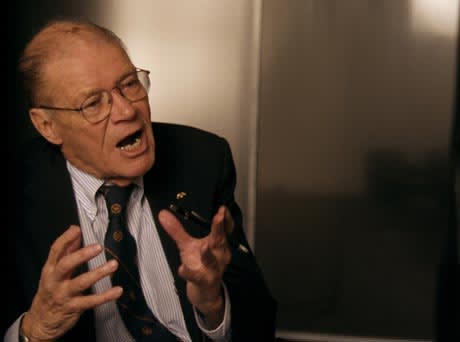Errol Morris's (The Thin Blue Line, Mr. Death) latest documentary centres on a series of interviews with former U.S. Secretary of Defense Robert McNamara. Structured as 11 lessons from McNamara's life, the film offers a complex exploration into the controversial figure, showing him to be thoughtful, intelligent and even emotional, while not shying away from his defensiveness about the many wartime atrocities that he was directly or indirectly responsible for.
With McNamara's biography intrinsically connected to many of the significant events in the past century of U.S. military history, the documentary is able to show an interesting insider's perspective on things like the firebombing of Japan in World War II, the Cuban Missile Crisis and the war in Vietnam. Morris combines the simple interview scenes, which train the camera closely on McNamara's aging face and leave it there to scrutinise the emotion accompanying each statement, with an amazing collection of historical stock footage that gives a feel for the times in question. Phillip Glass underscores the whole film sparsely and effectively, his music providing dramatic tension in all the right places.
The subject matter is, of course, sadly and incredibly relevant, and the film includes many eerily familiar sound bites about previous U.S. attempts to wage war on "tyranny and oppression." The most fascinating aspects of the film, though, are McNamara's constant musings on the moral ambiguity of his own past and of wartime actions in general, and his seeming obsession with thinking about what might have been had certain events, such as the death of J.F.K., not occurred. (Mongrel Media)
With McNamara's biography intrinsically connected to many of the significant events in the past century of U.S. military history, the documentary is able to show an interesting insider's perspective on things like the firebombing of Japan in World War II, the Cuban Missile Crisis and the war in Vietnam. Morris combines the simple interview scenes, which train the camera closely on McNamara's aging face and leave it there to scrutinise the emotion accompanying each statement, with an amazing collection of historical stock footage that gives a feel for the times in question. Phillip Glass underscores the whole film sparsely and effectively, his music providing dramatic tension in all the right places.
The subject matter is, of course, sadly and incredibly relevant, and the film includes many eerily familiar sound bites about previous U.S. attempts to wage war on "tyranny and oppression." The most fascinating aspects of the film, though, are McNamara's constant musings on the moral ambiguity of his own past and of wartime actions in general, and his seeming obsession with thinking about what might have been had certain events, such as the death of J.F.K., not occurred. (Mongrel Media)
